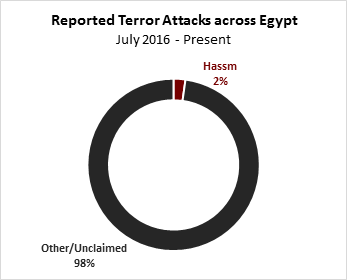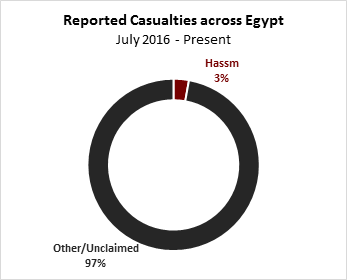Jacob Greene, Senior Research Associate & Christian Barsoum, Egypt Security Watch project Intern.
The mainland-based Harikat Souad Masr, known by the acronym “Hassm” (or “Hasam”) and translated as “decisiveness,” claimed responsibility today for its twelfth attack since forming last summer. The group, which Egyptian courts designated a terror organization in February of this year, reportedly attacked a security patrol at the intersection of the Waha and Ring Roads, killing at least three security personnel. According to a statement published on its official telegram account, the group promised to release footage of the incident. The attack is noteworthy for being the first conducted by what the group described as a newly-formed special operations unit “Hawks of Hassm.”
Despite the attention it receives in media, Hassm has carried out relatively few attacks compared to other groups operating in Egypt. Of the 510 attacks reported across the country since Hassm’s first claimed attack on July 18, 2016, its activity makes up only two percent. Casualty estimates from Hassm’s activity follow a similar trend, with only about three percent of the 1,119 reported terror-related casualties claimed by that group.


Hassm has conducted several operations against Egypt’s security personnel in recent months. On March 26, 2017, Hassm targeted a security patrol using an improvised explosive (IED) in the Nile Delta province of Qalyubia. The group alleged to have gravely wounded five security personnel in the operation. Weeks before, on March 8, Hassm claimed to have killed a man accused of collaborating with security forces. And then on December 9, 2016, coincidentally two days before the Islamic State-claimed cathedral bombing in Cairo, Hassm claimed responsibility for a car bombing that targeted a security checkpoint in Giza’s Haram district. That blast claimed the lives of six policemen and injured three others. The group has also notably claimed assassination attempts on former Grand Mufti of al-Azhar Ali Gomaa and Assistant Prosecutor-General Zakaria Abdel Aziz Ahmed.
Unlike some other terror organizations present in Egypt, Hassm is unique in that it documents each of its operations with pictures or video footage. The reasoning behind this is not explicit, but it lends the group an image of consistency, organization, and competence (regardless of whether this is actually true).
Based on its propaganda, the group appears motivated to a large extent by the alleged crimes of Egyptian security personnel against civilians, and thus it seeks to carry out acts of revenge against them. This contrasts markedly with the ideological underpinnings of takfiri organizations like the Islamic State or al-Qaeda, which seek to implement an Islamic caliphate; after the Islamic State carried out attacks on churches in Tanta and Alexandria on Palm Sunday, Hassm released a statement distancing themselves from the attack and blaming the state for taking away the people’s freedom. That is certainly not to suggest that Hassm is insulated from any external influence, but rather that they appear to have a more nationally-bound agenda at this time. Hassm has not expressed any interest in attacking foreign interests.
Egyptian security forces have directed a number of counter-terrorism operations at the group. Notably, security personnel in December 2016 killed Muhammad Ashour Dashisha during a security raid in Sixth of October City; Hassm later released a martyrdom announcement acknowledging his death. Weeks later, in January 2017, authorities referred 300 alleged members of the organization to military prosecution, of which 144 have so far been detained.
The continued presence and operations of a variety of terror organizations in Egypt poses significant policy challenges. The groups’ continued targeting of security forces and attempted high level assassinations undermines Egypt’s stability and the credibility of state institutions to provide the security that has become a focal point of many major legal and political. Additionally, while Hassm has yet to adopt civilian targeting on a wide scale, Egypt has witnessed the evolution of terror groups in this regard. In order to better combat Hassm and other terrorist entities, the Egyptian state must target its efforts through credible investigations and operations carried out in accordance with domestic and international law, to both eradicate specific threats and undermine terror groups’ narratives.